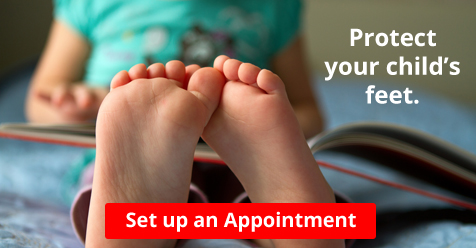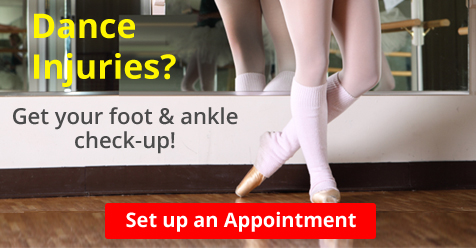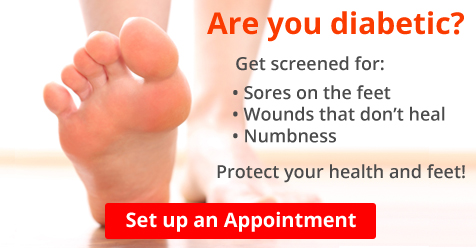August 2018
Children Who Are Prone to Develop Sever’s Disease
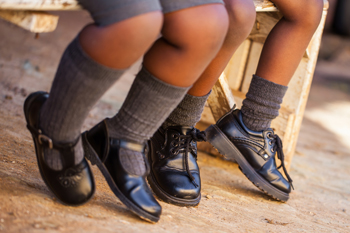 If your physically active child complains of heel pain, it may be a result of a condition referred as Sever’s disease. It is generally caused by excessive strain put on the growth plate of the heel, and typically affects children who are young adolescents. There are several symptoms that may be associated with Sever’s disease, including swollen heels, difficulty while walking, and tenderness in the foot and heel. The child may experience general pain and discomfort and it’s suggested to cease the activity that caused this condition while the healing takes places. Despite the fact that this ailment may be prevalent in physically active children, research has shown there may be additional factors in the development of Sever’s disease. These may include wearing shoes that do not fit correctly, obesity, or having flat or high arches. If you feel your child may have this affliction, please schedule a consultation with a podiatrist who will determine the best course of treatment as quickly as possible.
If your physically active child complains of heel pain, it may be a result of a condition referred as Sever’s disease. It is generally caused by excessive strain put on the growth plate of the heel, and typically affects children who are young adolescents. There are several symptoms that may be associated with Sever’s disease, including swollen heels, difficulty while walking, and tenderness in the foot and heel. The child may experience general pain and discomfort and it’s suggested to cease the activity that caused this condition while the healing takes places. Despite the fact that this ailment may be prevalent in physically active children, research has shown there may be additional factors in the development of Sever’s disease. These may include wearing shoes that do not fit correctly, obesity, or having flat or high arches. If you feel your child may have this affliction, please schedule a consultation with a podiatrist who will determine the best course of treatment as quickly as possible.
Sever's disease often occurs in children and teens. If your child is experiencing foot or ankle pain, see Dr. Nahid Birjandi at Mission Viejo, CA. Our doctor can treat your child’s foot and ankle needs.
Sever’s Disease
Sever’s disease is also known as calcaneal apophysitis, which is a medical condition that causes heel pain I none or both feet. The disease is known to affect children between the ages of 8 and 14.
Sever’s disease occurs when part of the child’s heel known as the growth plate (calcaneal epiphysis) is attached to the Achilles tendon. This area can suffer injury when the muscles and tendons of the growing foot do not keep pace with bone growth. Therefore, the constant pain which one experiences at the back of the heel will make the child unable to put any weight on the heel. The child is then forced to walk on their toes.
Symptoms
Acute pain – Pain asscoiatied with Sever’s disease is usually felt in the heel when the child engages in physical activity such as walking, jumping and or running.
Highly active – Children who are very active are among the most susceptible in experiencing Sever’s disease, because of the stress and tension placed on their feet.
If you have any questions, please feel free to contact our office located in Mission Viejo, CA. We offer the newest diagnostic and treatment technologies for all your foot and ankle injuries.
Read more about Sever's DiseaseDo your Child's Feet Hurt?
What May Be Causing Your Cracked Heels
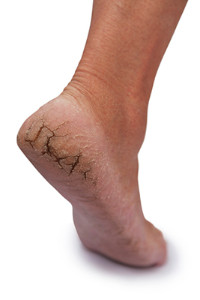 According to a survey, “20 percent of adults in the United States experience cracked skin on their feet.” Cracked heels are the result of an insufficient amount of moisture on the feet. In severe cases, cracks can eventually become sore and start to bleed. There are many reasons why a person’s feet may begin to dry out. Although more obvious causes for dry skin are cold weather or dehydration, many may not know that taking hot baths and hot showers can cause your skin to dry out. If your cracked heels are caused by an underlying medical condition, it is important that you do not treat them on your own. You may need the help of a podiatrist to treat your dry skin, regardless of your medical history. He or she will be able to recommend the best treatment option for you based on your consultation.
According to a survey, “20 percent of adults in the United States experience cracked skin on their feet.” Cracked heels are the result of an insufficient amount of moisture on the feet. In severe cases, cracks can eventually become sore and start to bleed. There are many reasons why a person’s feet may begin to dry out. Although more obvious causes for dry skin are cold weather or dehydration, many may not know that taking hot baths and hot showers can cause your skin to dry out. If your cracked heels are caused by an underlying medical condition, it is important that you do not treat them on your own. You may need the help of a podiatrist to treat your dry skin, regardless of your medical history. He or she will be able to recommend the best treatment option for you based on your consultation.
Cracked heels are unsightly and can cause further damage to your shoes and feet. If you have any concerns, contact Dr. Nahid Birjandi from Mission Viejo, CA. Our doctor can provide the care you need to keep you pain-free and on your feet.
Cracked Heels
Cracked heels appear unappealing and can make it harder for you walk around in sandals. Aside from looking unpleasant, cracked heels can also tear stockings, socks, and wear out your shoes. There are several methods to help restore a cracked heel and prevent further damage.
How do you get them?
Dry skin is the number one culprit in creating cracked heels. Many athletes, walkers, joggers, and even swimmers suffer from cracked heels. Age and skin oil production play a role to getting cracked heels as well.
Promote Healing
Over the counter medicines can help, especially for those that need instant relief or who suffer from chronic dry feet.
Wear Socks – Wearing socks with medicated creams helps lock in moisture.
Moisturizers – Applying both day and night will help alleviate dryness which causes cracking.
Pumice Stones – These exfoliate and remove dead skin, which allows for smoother moisturizer application and better absorption into the skin.
Change in Diet
Eating healthy with a well-balanced diet will give the skin a fresh and radiant look. Your body responds to the kinds of food you ingest. Omega-3 fatty acids and zinc supplements can also revitalize skin tissue.
Most importantly, seek professional help if unsure how to proceed in treating cracked heels. A podiatrist will help you with any questions or information needed.
If you have any questions, please feel free to contact our office located in Mission Viejo, CA. We offer the newest diagnostic and treatment technologies for all your foot care needs.
Read more about Solutions for Cracked HeelsHow to Practice Proper Foot Care
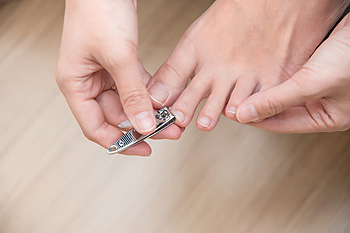 You should always take care of your feet to make sure they stay at their best. If you are looking for ways to practice proper foot care, you should start with washing your feet every day in warm water. When you are finished washing your feet, you should carefully dry them and make sure the spaces between your toes are dry as well. Additionally, you should check your feet every day to see if there are any sores, blisters, or cuts on your feet. Trimming your toenails is another important step in foot care. When you cut your nails, be sure to cut them straight across instead of in a rounded shape. If you find it difficult to trim your nails or need guidance on how to properly care for your feet, an appointment with your podiatrist can help.
You should always take care of your feet to make sure they stay at their best. If you are looking for ways to practice proper foot care, you should start with washing your feet every day in warm water. When you are finished washing your feet, you should carefully dry them and make sure the spaces between your toes are dry as well. Additionally, you should check your feet every day to see if there are any sores, blisters, or cuts on your feet. Trimming your toenails is another important step in foot care. When you cut your nails, be sure to cut them straight across instead of in a rounded shape. If you find it difficult to trim your nails or need guidance on how to properly care for your feet, an appointment with your podiatrist can help.
Everyday foot care is very important to prevent infection and other foot ailments. If you need your feet checked, contact Dr. Nahid Birjandi from Mission Viejo, CA. Our doctor can provide the care you need to keep you pain-free and on your feet.
Everyday Foot Care
Often, people take care of their bodies, face and hair more so than they do for their feet. But the feet are a very important aspect of our bodies, and one that we should pay more attention to. Without our feet, we would not be able to perform most daily tasks.
It is best to check your feet regularly to make sure there are no new bruises or cuts that you may not have noticed before. For dry feet, moisturizer can easily be a remedy and can be applied as often as necessary to the affected areas. Wearing shoes that fit well can also help you maintain good foot health, as well as making it easier to walk and do daily activities without the stress or pain of ill-fitting shoes, high heels, or even flip flops. Wearing clean socks with closed shoes is important to ensure that sweat and bacteria do not accumulate within the shoe. Clean socks help to prevent Athlete’s foot, fungi problems, bad odors, and can absorb sweat.
If you have any questions please feel free to contact our office located in Mission Viejo, CA. We offer the newest diagnostic and treatment technologies for all your foot and ankle needs.
Read more about Everyday Foot CareChildren and Plantar Warts
 If you find that your child complains of pain in the heel area of the foot, you may want to see if a plantar wart is present. A wart that develops and grows on the heel of the foot is referred to as a plantar wart. Despite the fact that it is known to be a harmless skin growth, it may generate severe pain and discomfort while walking. While many types of warts are visible on other parts of the body, a plantar wart grows inward as a result of the pressure the heel endures while walking, and may be difficult to notice. It is generally contagious, and may easily spread to other parts of the body. It’s suggested that your child refrains from sharing towels in addition to wearing protective shoes in public pools and shower areas. If your child develops a fever or if you notice liquid that drains from the wart, it’s advised to consult with a podiatrist as quickly as possible to learn about correct treatment options.
If you find that your child complains of pain in the heel area of the foot, you may want to see if a plantar wart is present. A wart that develops and grows on the heel of the foot is referred to as a plantar wart. Despite the fact that it is known to be a harmless skin growth, it may generate severe pain and discomfort while walking. While many types of warts are visible on other parts of the body, a plantar wart grows inward as a result of the pressure the heel endures while walking, and may be difficult to notice. It is generally contagious, and may easily spread to other parts of the body. It’s suggested that your child refrains from sharing towels in addition to wearing protective shoes in public pools and shower areas. If your child develops a fever or if you notice liquid that drains from the wart, it’s advised to consult with a podiatrist as quickly as possible to learn about correct treatment options.
Plantar warts can be very uncomfortable. If you need your feet checked, contact Dr. Nahid Birjandi from Mission Viejo, CA. Our doctor will assist you with all of your foot and ankle needs.
About Plantar Warts
Plantar warts are the result of HPV, or human papillomavirus, getting into open wounds on the feet. They are mostly found on the heels or balls of the feet.
While plantar warts are generally harmless, those experiencing excessive pain or those suffering from diabetes or a compromised immune system require immediate medical care. Plantar warts are easily diagnosed, usually through scraping off a bit of rough skin or by getting a biopsy.
Symptoms
- Lesions on the bottom of your feet, usually rough and grainy
- Hard or thick callused spots
- Wart seeds, which are small clotted blood vessels that look like little black spots
- Pain, discomfort, or tenderness of your feet when walking or standing
Treatment
- Freezing
- Electric tool removal
- Laser Treatment
- Topical Creams (prescription only)
- Over-the-counter medications
To help prevent developing plantar warts, avoid walking barefoot over abrasive surfaces that can cause cuts or wounds for HPV to get into. Avoiding direct contact with other warts, as well as not picking or rubbing existing warts, can help prevent the further spread of plantar warts. However, if you think you have developed plantar warts, speak to your podiatrist. He or she can diagnose the warts on your feet and recommend the appropriate treatment options.
If you have any questions please feel free to contact our office located in Mission Viejo, CA. We offer the newest diagnostic and treatment technologies for all your foot and ankle needs.
Read more about What Are Plantar Warts?


